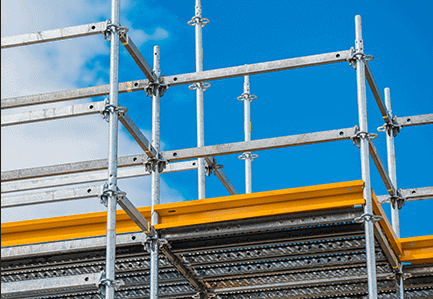Aluminum is an abundant metal that makes up about 8% of the Earth’s solid surface. It’s so widespread that it ranks as the 3rd most abundant element behind oxygen and silicon. Today, the metal is used every day by most people on the planet because aluminum is versatile enough to be used in all sorts of products. It’s corrosion-resistant, strong, durable, and most importantly, it’s economically priced to help keep costs down. Aluminum is also environmentally friendly because it’s 100% recyclable, so you can do your part for the environment while reducing your operating expenses at the same time.
Most Common uses of Aluminum
In many ways, aluminum is something of a miracle metal. It has so many properties that make it ideal for use, which is exactly why it’s so sought after. Some of aluminum’s characteristics are that it’s:
- Strong and lightweight
- Abundantly available
- Conductive
- Corrosion-resistant
- Soft to cut but capable of hardening
Aluminum’s excellent corrosion resistance has made it wildly popular in the construction industry. It’s used for the exterior cladding of buildings as well as other exposed parts, like window frames. Despite having the strength to be used as a building material, it’s also light enough to be used in cars and planes as well. Its ability to conduct electricity combined with its soft malleability has also found it a place for short and long-distance power lines. Finally, its abundance has made it the metal of choice for the household. It’s used as aluminum foil for cooking, and every soda in the world uses aluminum cans.
Interesting Facts About Aluminum
Aside from being used in nearly every industry in the world, aluminum also has a lot of interesting facts. For example, it’s used to create lightweight batteries like nearly every rechargeable battery on the market today.
Many different types of aluminum alloys can be used to create high-performance components like engine blocks and transmission housings. For example, its use in transportation can be seen with the aluminum alloy processing used to create engine blocks for F-150 Ford trucks and other similar vehicles.
Today, aluminum use has been extended from a limited number of applications for each alloy type to thousands of aluminum alloys with widely varied properties and compositions suited for many different end-use products.
Aluminum’s Economic Properties
Aluminum’s economic properties make it an ideal substitute for steel because aluminum is more cost-effective while still offering steel’s resistance and durability.
For example, aluminum tubing is a lightweight aluminum structural unit with the added benefit of being corrosion resistant and able to withstand harsh weather conditions like rain and snow. Aluminum tubing is ideal for use in trusses, beams, and columns because it requires less maintenance than steel piping, which allows aluminum to be used as a more economical alternative.
Low Density
Aluminum is a metal that has a low density. The density varies depending on the alloy, but it can be as low as 2.7 g/cm³. Water’s density sits at 1 g/cm³, meaning aluminum is literally light enough to float on water. You can see why ship builders might be interested in the metal.
The formation of an aluminum alloy is similar to the way iron forms steel. Aluminum is combined with other metals to strengthen it and lower its density at the same time. We’ve discussed some basic advantages of aluminum in a previous blog, but here are a few examples of how those traits be put to use.
Enhancing Buildings
One of the most popular uses for aluminum materials is hardening buildings. With half the weight of steel reinforcement and a seventh of concrete, architects have been given the freedom to design structures in ways that were never possible in the past. Structures like the Shard in London, the Opus in Dubai, or the Vancouver House in, you guessed it, Vancouver. None of these structures would be possible without aluminum.
It doesn’t stop with the malleability of building design, though. Aluminum can replace many smaller, expensive materials like brass or steel. The metal can also go through a process called “anodizing,” which creates a porous layer that can be dyed to create unique surfaces. Aluminum can be used to create detailing like wall facades, sculptures, and the metal provides superior insulation compared to stone or brick.

Durable & Recyclable
A lightweight, strong metal that can be used for many different purposes. Its corrosion resistance stops it from rusting or oxidizing like other materials. This makes it the go-to metal for outdoor use where weather conditions are harsh.
As if this miracle of a metal wasn’t impressive enough, it’s also 100% recyclable. So, in addition to doing just about everything you need, you can also feel good knowing it helps reduce landfill waste.

The Metal of Choice for Transportation
The aluminum industry is worth over $200 billion to the economy alone, with the metal being found in nearly everything from planes to cars to high-speed trains. The ubiquitous nature of the metal in these different modes of transportation is typically due to weight reduction. The lighter a vehicle is, the less fuel it burns through.
Auto Industry
While the auto industry still heavily relies on steel, aluminum has been widely adopted to increase fuel efficiency and reduce CO² emissions. It’s believed that the average aluminum content in a car will increase by 60% by 2025 as automakers continue to turn away from traditional alloy steel.
Railways & Planes
Aluminum has also found its place in high-speed trains like the Shinkansen in Japan and the Maglev in Shanghai. Shinkansen utilizes the metal as an alloy in their train bodywork, whereas Maglev uses it to reduce friction resistance. Both uses allow the railways to reduce the weight ratio of their trains.
Strengths Compared to Other Metals
Highly regarded for its durable and economic properties, the manufacturing process that goes into aluminum saves companies time and money. The metal’s ability to be produced in sheets or extruded into pre-made shapes provides countless options for use. Aluminum really is one of the most versatile metals in the world, and that’s no exaggeration.
Click here to learn more about American Douglas Metals’ custom aluminum extrusion solutions and get a FREE quote on your next project.
